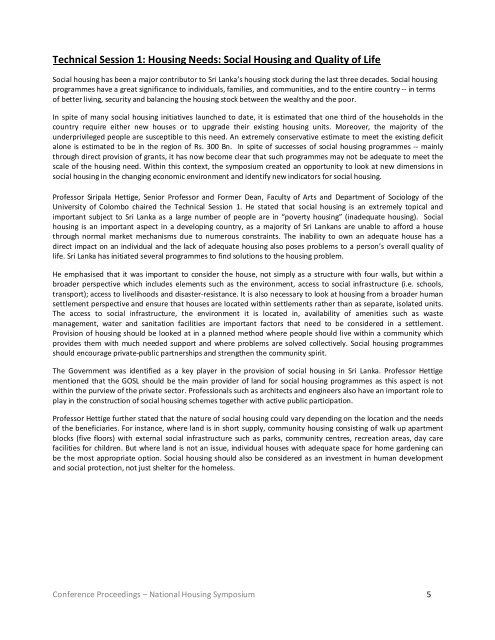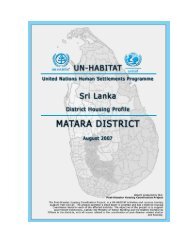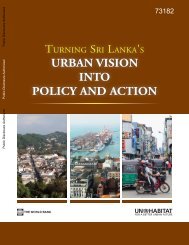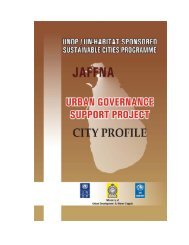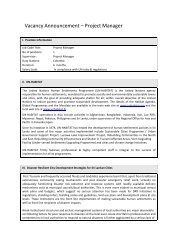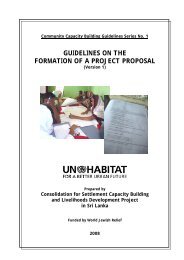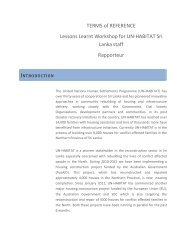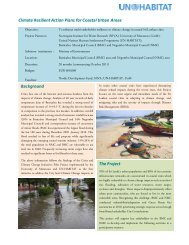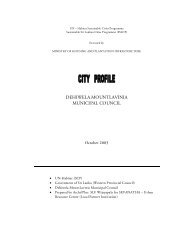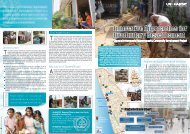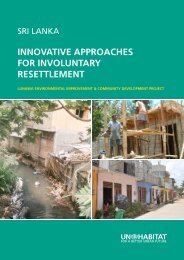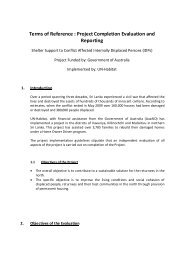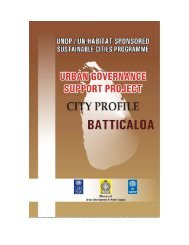Conference Proceedings : âJANASEVANAâ National ... - UN HABITAT
Conference Proceedings : âJANASEVANAâ National ... - UN HABITAT
Conference Proceedings : âJANASEVANAâ National ... - UN HABITAT
Create successful ePaper yourself
Turn your PDF publications into a flip-book with our unique Google optimized e-Paper software.
Technical Session 1: Housing Needs: Social Housing and Quality of Life<br />
Social housing has been a major contributor to Sri Lanka’s housing stock during the last three decades. Social housing<br />
programmes have a great significance to individuals, families, and communities, and to the entire country ‐‐ in terms<br />
of better living, security and balancing the housing stock between the wealthy and the poor.<br />
In spite of many social housing initiatives launched to date, it is estimated that one third of the households in the<br />
country require either new houses or to upgrade their existing housing units. Moreover, the majority of the<br />
underprivileged people are susceptible to this need. An extremely conservative estimate to meet the existing deficit<br />
alone is estimated to be in the region of Rs. 300 Bn. In spite of successes of social housing programmes ‐‐ mainly<br />
through direct provision of grants, it has now become clear that such programmes may not be adequate to meet the<br />
scale of the housing need. Within this context, the symposium created an opportunity to look at new dimensions in<br />
social housing in the changing economic environment and identify new indicators for social housing.<br />
Professor Siripala Hettige, Senior Professor and Former Dean, Faculty of Arts and Department of Sociology of the<br />
University of Colombo chaired the Technical Session 1. He stated that social housing is an extremely topical and<br />
important subject to Sri Lanka as a large number of people are in “poverty housing” (inadequate housing). Social<br />
housing is an important aspect in a developing country, as a majority of Sri Lankans are unable to afford a house<br />
through normal market mechanisms due to numerous constraints. The inability to own an adequate house has a<br />
direct impact on an individual and the lack of adequate housing also poses problems to a person’s overall quality of<br />
life. Sri Lanka has initiated several programmes to find solutions to the housing problem.<br />
He emphasised that it was important to consider the house, not simply as a structure with four walls, but within a<br />
broader perspective which includes elements such as the environment, access to social infrastructure (i.e. schools,<br />
transport); access to livelihoods and disaster‐resistance. It is also necessary to look at housing from a broader human<br />
settlement perspective and ensure that houses are located within settlements rather than as separate, isolated units.<br />
The access to social infrastructure, the environment it is located in, availability of amenities such as waste<br />
management, water and sanitation facilities are important factors that need to be considered in a settlement.<br />
Provision of housing should be looked at in a planned method where people should live within a community which<br />
provides them with much needed support and where problems are solved collectively. Social housing programmes<br />
should encourage private‐public partnerships and strengthen the community spirit.<br />
The Government was identified as a key player in the provision of social housing in Sri Lanka. Professor Hettige<br />
mentioned that the GOSL should be the main provider of land for social housing programmes as this aspect is not<br />
within the purview of the private sector. Professionals such as architects and engineers also have an important role to<br />
play in the construction of social housing schemes together with active public participation.<br />
Professor Hettige further stated that the nature of social housing could vary depending on the location and the needs<br />
of the beneficiaries. For instance, where land is in short supply, community housing consisting of walk up apartment<br />
blocks (five floors) with external social infrastructure such as parks, community centres, recreation areas, day care<br />
facilities for children. But where land is not an issue, individual houses with adequate space for home gardening can<br />
be the most appropriate option. Social housing should also be considered as an investment in human development<br />
and social protection, not just shelter for the homeless.<br />
<strong>Conference</strong> <strong>Proceedings</strong> – <strong>National</strong> Housing Symposium 5


